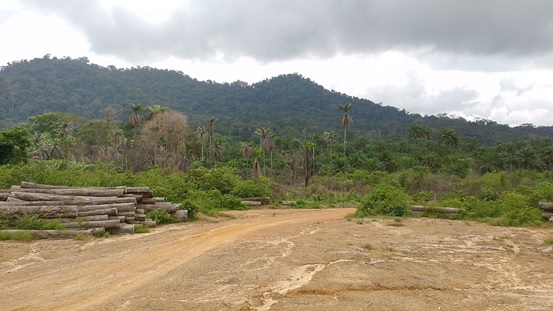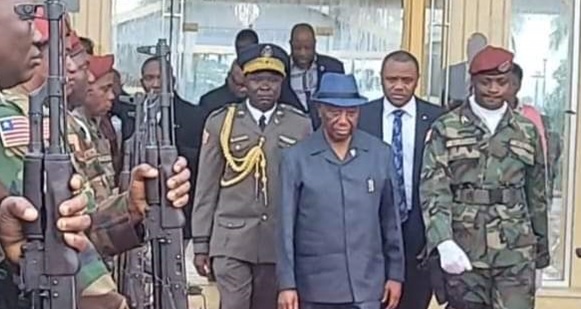Henry B. Gboluma, Jr./ Internews Environmental Reporting Fellow
BOPOLU CITY, Gbarpolu – In the Bondi Mandingo Community Forest of Liberia’s Bopolu District, the shadows of a logging industry’s past linger, casting a complex web of challenges and opportunities for the community.
For years, logging companies have invaded their lands, cutting down massive trees and leaving behind a trail of destruction.
Though the promise of jobs and economic growth was tempting, locals have begun to realize the cost.
Stanford David, a lifelong resident and mother of three in Gbarquoista of Bopolu district, voiced the growing frustration in the community. She said, “They came in, cut down our trees, took some, and left us with nothing,” She said, “We see the beauty of our forest dying,” so, “we want to protect our home for our children.”
The community has rallied together, pushing for safeguarding initiatives that prioritize the health of their environment over short-term profits. Local leaders, like Stanford David, the head of the General town Chief of four towns within the Bondi Authorized Community Forest, have taken charge. “We need to stand up for our land. This Logging Company that was here promised us jobs, good roads and education, but all we got were abandoned logs and damaged forest.”
Logging in Liberia has a storied history, marked by the exploitation of the country’s abundant natural resources by foreign companies. Decades of unchecked logging led to deforestation, habitat destruction, and the displacement of indigenous communities.
Despite efforts to regulate the industry, the impact of unsustainable practices continues to echo through the forests of Liberia.
In Bondi Authorized Community Forest in Bopolu District, the remnants of a lodging company’s negligence are starkly visible – massive abandoned logs scattered amidst the trees, a haunting reminder of the industry’s footprint.
Bondi Mandingo Community Forest in 2018 signed a 15-year agreement with Indo Africa, a company from Singapore in anticipation of development that covers 37,222 hectares.
The company agreed to pay the community US$46,527 as annual land rental fees, US$35,000 as a scholarship fund and US$25,000 for yearly support to community healthcare.
Additionally, Indo Africa promised to recondition roads, construct modern latrines, a youth center and a paramount chief office in affected communities. However, six years on, the company has not honored the agreement.
It harvested 7,183 logs, according to the company’s production records and only paid US$65,000 for land rental and harvesting fees.
It owes Bondi Mandingo over US$400,000 in land rental and harvesting fees, and mandatory development projects, barely exploiting the forest.
“We are now pushing to cancel the contract,” said Darkanel Gbarto, the Chairman of the Bondi Mandingo forest executive committee. “There has been no progress on the side of the company, so we are now in court to terminate that bad contract to allow us to look for a new investor.”
Despite the fact that the Executive Committee is pushing for the cancellation of this third party agreement, majorities of the community and forest management leaders in Bopolu have expressed their dismay at the environmental degradation caused by such actions, emphasizing the urgent need for greater accountability and responsible practices.
Sarah Kollie, a respected community female teacher in one of the forest affected communities, said, “This forest is our lifeblood and everything for us, and it is about time that we support the forest management team in court action to protect our forest for future generations.”
Mark Dennis, the chief officer of the Bondi Authorized Community Forest said, “We must shift our focus towards conservation and tourism to safeguard our environment and create opportunities for sustainable development.”
He said, “We are pushing for conservation because the logging business did not benefit us, so, we are looking for partners in conservation and tourism,” Dennis said, “our trees can even be standing while we getting money out of them, and this can also create jobs and protect our environment at the same time. It’s about finding balance.”
Conservation is the responsible management of natural resources to protect ecosystems and wildlife, while Tourism focused on attracting visitors to experience natural and cultural attractions.
Conservation can enhance local livelihoods through sustainable practices, while tourism can provide economic opportunities but may also strain resources and disrupt local cultures.
While the local community pushes for change, the Forest Development Authority (FDA) has taken notice. The FDA County Coordinator Gayflor Kemah said, “Logging can provide economic benefits, but it needs to be done responsibly. We have seen areas devastated by reckless practices. We support community conservation efforts, as they can help mitigate climate change effects and preserve biodiversity.”
He further emphasized the importance of collaboration. “We want to work with local leaders to establish guidelines that protect the environment while allowing for sustainable logging. It’s crucial we listen to the voices of the community.”
Meanwhile, the FDA has also pledged to support any community’s initiatives. “We believe in empowering local voices,” he said, “If the community and the forest management body can lead these conservation efforts, we will back them with ideas and training.”
Amidst these discussions, some loggers expressed their concerns as well. Jerry Karmon, a former logger turned community advocate, said, “I used to think logging was the only way to make a living. But now I see how it harms the land. I joined the conservation push because I want to change things for the better. We can do this together.”
The Regional FDA expert also weighed in on the urgent need for change, emphasizing the linkage of climate change and environmental degradation. “The impacts of climate change are undeniable, and Liberia must act decisively to mitigate its effects,” said Mr. Kollie Bonner.
By embracing conservation and sustainable tourism, Liberia can build a resilient future that protects both its people and its natural resources according to the FDA Regional Coordinator.
“Right now, Liberia stands at a crossroads,” he said that with this call from local leaders directed towards conservation and sustainable tourism as a means to combat climate change and promote responsible development is a welcoming advocacy.
He believes that by harnessing the power of community engagement, government support, and sustainable practices, not just the community but Liberia can forge a path towards a more sustainable and green future.







